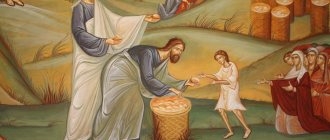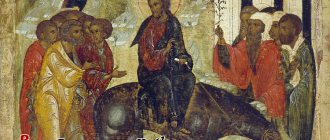"Save me, God!".
Thank you for visiting our website, before you start studying the information, please subscribe to our Orthodox community on Instagram, Lord, Save and Preserve † - https://www.instagram.com/spasi.gospodi/. The community has more than 400,000 subscribers. There are many of us like-minded people and we are growing quickly, we post prayers, sayings of saints, prayer requests, and timely post useful information about holidays and Orthodox events... Subscribe. Guardian Angel to you!
Good afternoon, brothers and sisters. We ask you to subscribe to our Orthodox page on Instagram https://www.instagram.com/spasi.gospodi/. We lead it with soul and we already have more than 400,000 subscribers. Join us. Guardian angel to you!
From the Bible we know that there were seven days and on each day the Lord worked miracles. He left only one day for rest. Many people ask the question of how to spend Sunday as an Orthodox Christian? The answer is that you can work on this day, but first of all, this work must be spiritual. That is why it is worth dedicating it to God and establishing a connection with him that could have weakened due to constant bustle. Many priests recommend spending the day in prayer, visiting church and worship, and reading spiritual literature.
What believers can and cannot do on Sunday
Life makes its own adjustments to people's daily routines. Many of them work in shifts, have irregular working hours, and sometimes need to be at work on Sunday. There are no categorical prohibitions on this. The Church says that on this day you cannot work for profit or perform actions that can be postponed.
It is strictly forbidden on Sunday:
- quarrel and swear with others;
- gamble;
- commit adultery, drink large amounts of alcohol;
- gossip and slander;
- provoke scandals and quarrels;
- visit fortune tellers and sorcerers.
Of course, all these actions are not welcomed by the church on other days of the week.
Orthodox Life
Archpriest Vladimir Rovinsky knows the answer.
A significant part of our fellow citizens try to respect religious holidays and spend them... in idleness. And almost everyone lives by the principle: “You can’t work on holidays, but if you really need to, then you can!” Every more or less advanced “admirer” of holidays finds justification for himself in the Bible. What does Scripture really say?
In the Old Testament, in the Book of Exodus, we read: “Remember the Sabbath day, to keep it holy; Six days you shall work and do all your work, but the seventh day is the Sabbath of the Lord your God” (Exodus 20:8). As we see, we are talking about the fact that the Lord commands one of the seven days of the week to be a day of rest (Saturday - Hebrew “Sabbath”, Russian “day of rest”), which God Himself “blessed” and “sanctified” (Ex. 20 :eleven). In the biblical Book of Deuteronomy we once again hear the reminder: “Observe the Sabbath day, to keep it holy” (Deut. 5:12). This means that not only the Creator sanctified the seventh day of the week, but we must also keep it holy. Among the week, the sanctified day for us Christians was, first of all, the day when Christ rose from the dead - that’s why we call it “resurrection.”
However, all the rules for celebrating this day also apply to holidays, as was the case in the Old Testament. What should be the difference between a weekday and a Sunday or holiday? The fourth Commandment of the Old Testament itself already contains the answer.
Let’s read it again: “Six days you shall work and do all your work.” The Lord emphasizes that we should do our deeds over the course of six days, and on the seventh - deeds dedicated to “the Lord your God” (Ex. 20:8). In the book of the prophet Isaiah, the following instruction sounds: “If you will restrain your foot for the sake of the Sabbath from doing your desires on My holy day, and you will call the Sabbath a delight, the holy day of the Lord, honored, and you will honor it by not doing your usual business, please your desires and talk idle talk, then you will have joy in the Lord” (Isaiah 58:13). This means that we are not talking about the day that we spent in idleness fishing, on a picnic, or on the couch watching TV, but about the one that we dedicated to the Lord.
It turns out that you can dedicate, that is, give as a sacrifice to the Lord, not only a candle or money - you can and should dedicate one of the days of our life. What does God need? Nothing! He is self-sufficient and He does not need anything from us. And if the Lord desires anything, it is only our comprehensive transformation and our inheritance of the benefits of eternal life.
We are commanded to work for six days so that we have a place to live, something to eat, drink and clothing. But indulging only in these concerns, forgetting about the soul, we, along with the ancient Jews, fall into Egyptian captivity and become slaves. To prevent this from happening, let us listen to the voice of the Holy Scripture: “Remember that you were a slave in the land of Egypt, but the Lord your God brought you out from there with a mighty hand and an outstretched arm; therefore the Lord your God commanded you to keep the Sabbath day.” (Deut. 5:15). Once the Monk Paisius the Holy Mountain was asked: “- Geronda, how can a person experience the holiday spiritually? - In order to survive the holiday, we need to immerse our mind in holy days, and not in those things that we need to do for the sake of these holy days. We must reflect on the events of each of the holy days, be it the Nativity of Christ, Epiphany, Easter or any other holiday, and say the Jesus Prayer, praising God.”
If we spend a holiday in peace from everyday affairs, if we sanctify it with prayer, attending worship services, reading books that are good for the soul, helping those in need, visiting the sick - this will be a day dedicated to the Lord.
I will focus on visiting the sick and helping those in need. Such visits and help will be meaningless if we do not work hard to help our neighbor. I remember that in my student years, I probably learned a wonderful lesson for the first time and appreciated another bright side of observing the Lord’s commandment about the holiday. It was some autumn holiday, and our seminarians’ classes were cancelled. After proper participation in the Liturgy and a festive meal, I hurried to my room. Like any decent student, after a hearty lunch I had one desire - to get enough sleep for the past sleepless nights and a little more for future use. On the way I met a parish priest I knew. He went into the seminary to find an assistant for what he called a festive occasion. The Lord sent me first on his path. And having learned that I was not doing anything right now, the priest, without much introduction, conspiratorially suggested: “You know, frosts have been promised from tomorrow. Went! Let's continue the holiday..."
We continued the holiday with a very elderly priest, Father Nikolai. His wife, mother, was ill and had been bedridden for several years. The old father himself, giving himself a cheerful appearance, could barely move around the cold house. They did not have gas heating. Someone brought a carload of firewood into Nikolai’s father’s yard that needed to be chopped. And on a holiday, two seemingly quite pious men - a priest and a seminarian - were chopping wood until late in the evening. Then we heated the stove and talked over tea for more than an hour with our immensely grateful hosts. Thirty years have passed since then. I have already begun to forget how the next day every muscle of my body, relaxed from studying, ached unbearably, but I will never forget that festive mood, that unspeakable joy with which I returned home that day.
The holiday was a success!
Needlework
You should not do needlework on Sunday. Our ancestors believed that needle and thread were mystical objects. With their help, a needlewoman can either create a talisman or destroy someone’s life.
Beliefs warn that you should not cut or sew on Sunday, so as not to incur illness, misfortune and even death.
According to other signs, embroidery on a Sunday will not be successful - the product will be defective or the needlewoman will be injured.
Features of Sunday
Sunday is traditionally a day of rest, intended to prepare for the new work week and devote time to yourself, your family and friends. Experts are confident that by insuring themselves with the help of folk signs, everyone can make Sunday the most successful day of the week, attract the attention of Her Majesty Fortune and heaven. In addition, the storehouse of knowledge inherited from our ancestors will allow us to avoid unsuccessful decisions and actions that could open the door to a “dark streak.”
How to spend a day off
The central event of every weekend is the Eucharist. Therefore, every Christian must attend church on Sunday and take part in the Divine Liturgy. In some countries, markets are closed at this time, and people also do not go out on night or work shifts. For example, in Austria on such a day they try to reduce human labor to a minimum. And it is right. On Sundays it is enough for pharmacies and several grocery stores to be open.
But if it is not possible for a person to attend church in the morning, then for the soul’s sake one can attend the evening Liturgy. A person’s choice between Liturgy on Sunday and work for double pay can be a sin. If you can visit church on this day, but a person chooses money, then he is already sinning. It will also be considered a sin if you engage in heavy physical labor on this day.
Falling behind others: Signs you don't fit in with the office culture Worrying about social status: When the desire for success is damaging your psyche List the main ideas: How to express your point of view so that your boss will hear
It is undesirable on this day to clean, wash or make repairs, or tinker in the garden unless there is an urgent need. But if a person sews on a button or presses a button on an automatic washing machine, then it will no longer be a sin. Hobbies such as embroidering on Sunday will also not be a sin.
Sunday for Christians
Sunday was a day off in memory of the resurrection of Christ. According to the Jewish calendar, he rose from the dead on the first day of the week. And the Bible says this several times. Sunday became such a day for Jews. When the world was created, man sinned, and then he fell and rejected God. Therefore, the Lord enters into the history of mankind through Jesus Christ, with whom he was born, lived, and then died as a martyr, but not forever, but was able to conquer everything and rise again.
That is why Sunday has become such a big holiday that should be honored and respected. Therefore, working on this day off is undesirable, but if it is, for example, a medical worker, then such a celebration will not bring anything good. Therefore, each case must be considered separately.
Find time for a little rest: how to reward employees (not just with money)
The price of secondary housing in Sevastopol has reached 150 thousand rubles per square
How to make your home office the highlight of your interior: adding bright accents
Do's and don'ts
There is an opinion that there is a certain list of things that Orthodox Christians cannot do on Sunday, as well as on church holidays on which they cannot work
. It is said that you cannot work on this day for profit. And also you cannot do work that can be postponed to other days. The list of such cases includes:
- don't mow
- don't reap
- don't wash
- do not sew or do other housework,
- don't swear
- don't clean up
- don't do handicrafts
- do not work in the garden.
The best article for you, go to: Orthodox holiday of the Transfiguration of the Lord, history and what it means
Work in the garden
On Sunday you cannot work in the garden, garden or field - you may be left without a harvest. It was believed that physical labor would not only be in vain, but would also lead to sudden breakdowns, failures and injuries.
This prohibition is related to religion. Sunday should have been dedicated to God - attending church services, reflecting on the soul, doing good deeds and giving alms. Any household chores or physical labor were considered a sin.
People believed that violators of the ban deprived themselves of the protection of heavenly powers and became vulnerable to temptations and attacks of unclean spirits. As a result, they will be haunted by failures and misfortunes.
Results
In some situations, work during periods intended for rest (holidays, weekends) is necessary to maintain the normal operation of the enterprise. However, in most cases, employees must voluntarily agree to perform work duties outside of normal working hours. Additional work on weekends is prohibited for certain categories of employees (pregnant women, minors).
Sources: Labor Code of the Russian Federation
You can find more complete information on the topic in ConsultantPlus. Free trial access to the system for 2 days.
Folk signs for Sunday
- Get to know someone if a button comes off;
- A girl will be asked to marry if a bird knocks on the window with its beak;
- Expect profit if the right ear is on fire, and good luck in business if it is the left one. Cheeks glow before separation from a good comrade;
- Rejoice at accidentally breaking dishes, because large incomes will unexpectedly fall on you;
- You will attract good luck if you wear gold jewelry or topazes, diamonds, amber or rubies;
- White, crimson, yellow or red outfits will attract good luck because it is a symbol of the Sun;
List of Orthodox holidays during which you cannot work
There are several major or major holidays when it is prohibited to do any physical work. These include:
- Christmas, during which the Son of God was born - January 7th.
- Epiphany or Epiphany - January 19.
- The Presentation of the Lord, when Jesus Christ met Sineon the God-Receiver in the Temple of Jerusalem.
- The Annunciation, the announcement by Archangel Michael to the Blessed Virgin Mary of the Birth of the Son of God - April 7.
- Palm Sunday, which Catholics call Palm Sunday. A week before Easter, Jesus Christ rode into Jerusalem on a donkey, greeted by the inhabitants of the city.
- Holy Easter is a moving holiday, the date of which is set according to the lunar-solar calendar. This is the most important holiday of Orthodoxy - the day when Jesus Christ was resurrected.
- Ascension of the Lord.
- The Holy Trinity.
- Transfiguration of the Lord - celebrated on August 19.
- Dormition of the Blessed Virgin Mary - August 28.
- Nativity of the Virgin Mary – September 21.
- Exaltation of the Holy Cross - September 27.
- The day of the entry of the Blessed Virgin Mary into the temple of the city of Jerusalem is December 4.
All these dates are the main Orthodox holidays, during which one should leave mortal affairs and completely devote time to God’s prayer, visiting church, and rest.











